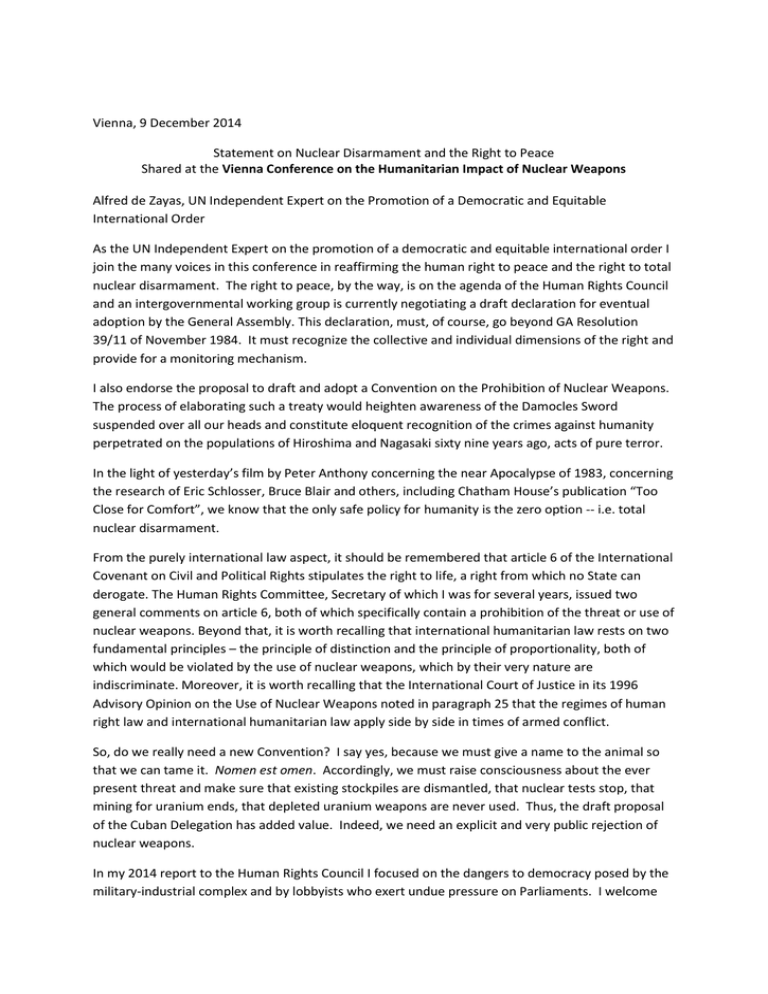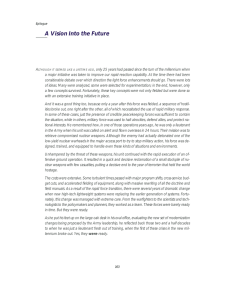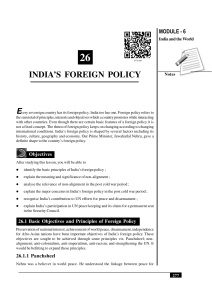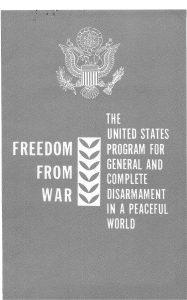Vienna, 9 December 2014
advertisement

Vienna, 9 December 2014 Statement on Nuclear Disarmament and the Right to Peace Shared at the Vienna Conference on the Humanitarian Impact of Nuclear Weapons Alfred de Zayas, UN Independent Expert on the Promotion of a Democratic and Equitable International Order As the UN Independent Expert on the promotion of a democratic and equitable international order I join the many voices in this conference in reaffirming the human right to peace and the right to total nuclear disarmament. The right to peace, by the way, is on the agenda of the Human Rights Council and an intergovernmental working group is currently negotiating a draft declaration for eventual adoption by the General Assembly. This declaration, must, of course, go beyond GA Resolution 39/11 of November 1984. It must recognize the collective and individual dimensions of the right and provide for a monitoring mechanism. I also endorse the proposal to draft and adopt a Convention on the Prohibition of Nuclear Weapons. The process of elaborating such a treaty would heighten awareness of the Damocles Sword suspended over all our heads and constitute eloquent recognition of the crimes against humanity perpetrated on the populations of Hiroshima and Nagasaki sixty nine years ago, acts of pure terror. In the light of yesterday’s film by Peter Anthony concerning the near Apocalypse of 1983, concerning the research of Eric Schlosser, Bruce Blair and others, including Chatham House’s publication “Too Close for Comfort”, we know that the only safe policy for humanity is the zero option -- i.e. total nuclear disarmament. From the purely international law aspect, it should be remembered that article 6 of the International Covenant on Civil and Political Rights stipulates the right to life, a right from which no State can derogate. The Human Rights Committee, Secretary of which I was for several years, issued two general comments on article 6, both of which specifically contain a prohibition of the threat or use of nuclear weapons. Beyond that, it is worth recalling that international humanitarian law rests on two fundamental principles – the principle of distinction and the principle of proportionality, both of which would be violated by the use of nuclear weapons, which by their very nature are indiscriminate. Moreover, it is worth recalling that the International Court of Justice in its 1996 Advisory Opinion on the Use of Nuclear Weapons noted in paragraph 25 that the regimes of human right law and international humanitarian law apply side by side in times of armed conflict. So, do we really need a new Convention? I say yes, because we must give a name to the animal so that we can tame it. Nomen est omen. Accordingly, we must raise consciousness about the ever present threat and make sure that existing stockpiles are dismantled, that nuclear tests stop, that mining for uranium ends, that depleted uranium weapons are never used. Thus, the draft proposal of the Cuban Delegation has added value. Indeed, we need an explicit and very public rejection of nuclear weapons. In my 2014 report to the Human Rights Council I focused on the dangers to democracy posed by the military-industrial complex and by lobbyists who exert undue pressure on Parliaments. I welcome the excellent resolution adopted by the Inter-Parliamentary Union during its 130th Assembly this spring and I encourage all Parliamentarians to promote disarmament as a necessary step toward development and an enabler of human rights. According to SIPRI statistics, the world spent 1.75 trillion US dollars in the military in 2013. According to studies conducted by the World Bank, SIPRI and UNICEF, some countries have spent 20, 30 or even 40 percent of their discretionary budgets for the military. This is an insult to the millions of children who go to bed hungry, to the millions who die for lack of health care. There is talk about a financial crisis, but the military is flourishing and NATO is pushing for increased military expenditures. At the same time, we hear about “austerity measures” which are being taken at the expense of education, health and social services and which have significantly aggravated unemployment. A downsizing of the military and a reorientation of resources toward achieving human security and the sustainable development goals must be undertaken. For this we need coordinated efforts such as those of the International Peace Bureau and its Global Campaign on Military Spending. We need synergies with the media so that the public is informed about the unconscionable waste of resources – particularly in further nuclear research and research into horrendous new weapons such as the killer robots or lethal autonomous weapon systems. Ladies and gentlemen, we are not facing a financial crisis, but a moral crisis and a crisis of priorities. We urgently need a change of mind-set and the realization that "national security" does not justify the risk of destroying the planet. What we need is conflict-prevention strategies and mutual respect. As we learned from Colonel Petrov in yesterday's documentary film, we must learn to listen to each other, to practice international solidarity on a daily basis. The American people do not want to annihilate the Russian people, the Russian people do not want to annihilate the American people. But our politicians sometimes live in their own bubble, and it is imperative to tone down the rhetoric. That is why I have recommended that a "De-escalation committee" be established in the General Assembly, a neutral forum where politicians can withdraw from unreasonable positions without losing face. We should not allow politicians to gallop away with rhetoric that violates article 20 of the International Covenant on Civil and Political Rights. We cannot allow sabre-rattling and war-mongering that may indeed lead to a dynamic of war. All human beings have the right to live in peace. And governments have the responsibility to ensure this right. Indeed, we must learn to live together as brothers so that we are not compelled to die together as dinosaurs. I thank you for your attention. Thank you.





